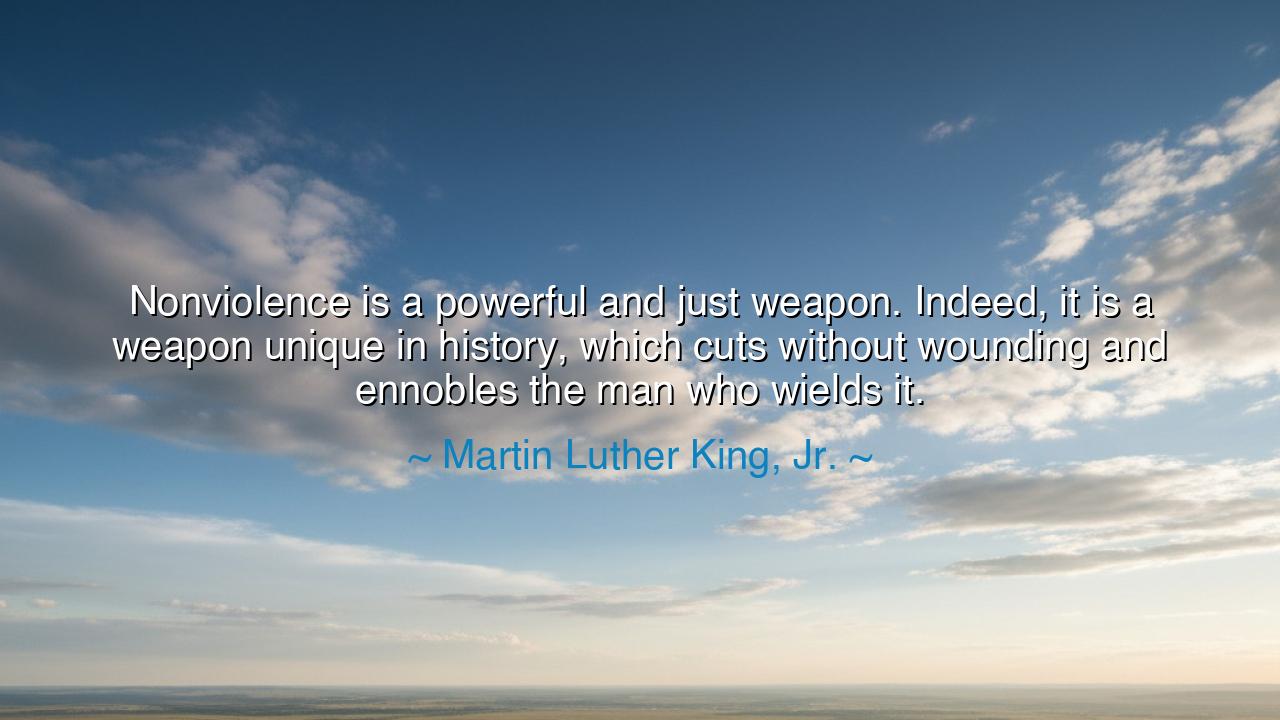
Nonviolence is a powerful and just weapon. Indeed, it is a weapon
Nonviolence is a powerful and just weapon. Indeed, it is a weapon unique in history, which cuts without wounding and ennobles the man who wields it.






When Martin Luther King, Jr. declared, “Nonviolence is a powerful and just weapon. Indeed, it is a weapon unique in history, which cuts without wounding and ennobles the man who wields it,” he spoke with the clarity of a prophet and the courage of a warrior whose battlefield was injustice itself. In these words, King reveals a profound paradox: true power does not lie in the fist, nor in the sword, nor in the roar of anger; it lies in the quiet strength of principled restraint. Nonviolence, he teaches, is not weakness but wisdom, a weapon that cuts through oppression without staining the soul, a force that transforms both society and the character of its practitioner.
The origin of this teaching emerges from King’s lifelong engagement with struggle in the American South. Born into a nation scarred by slavery, segregation, and systemic injustice, King witnessed violence both overt and insidious. Yet he recognized that the tools of aggression, though immediately effective, corrupt those who wield them and perpetuate cycles of hatred. Drawing upon the teachings of Mahatma Gandhi and the moral imperatives of his faith, King forged a philosophy in which the highest form of resistance is nonviolent action — an ethical weapon that asserts justice while preserving the humanity of all involved.
King’s words speak to a principle as old as history itself: that moral courage can triumph over brute force. Consider the story of Gandhi in India, who led millions in peaceful protests against colonial rule. His march to the sea, refusing to pay the salt tax, was not an attack in the conventional sense, yet it shattered the foundation of oppression. The rulers of the empire could not wield violence against peaceful demonstrators without revealing the cruelty of their system. King saw in Gandhi’s example a timeless truth: nonviolence amplifies righteousness and exposes injustice, whereas violence perpetuates darkness.
The power of nonviolence lies in its dual effect. It strikes at the injustice itself while protecting the integrity of the wielder. A person who raises a weapon of hate may wound the body, but the soul grows hardened and blind. The nonviolent warrior, however, demonstrates mastery over both the world and the self. King’s insistence that nonviolence “ennobles the man who wields it” reminds us that the fight for justice is not merely external, but profoundly internal. True strength is the ability to resist retaliation, to meet cruelty with courage, and to act with love even in the face of hatred.
History offers countless illustrations of this principle in action. During the Montgomery Bus Boycott, African Americans refused to ride segregated buses, enduring hardship without resorting to violence. Their resistance cut through the system of oppression and won rights that had long been denied, while preserving the moral high ground and dignity of the community. In this, King demonstrates that a weapon’s effectiveness is measured not solely in destruction, but in the ability to create justice, inspire change, and uplift the human spirit.
The ancients, too, recognized the paradoxical might of restraint. Lao Tzu taught that the soft overcomes the hard, and that rivers carve valleys not by force but by persistence. Sun Tzu counseled that the highest form of victory is to win without battle. King’s words echo these timeless truths: nonviolence is the art of victory without destruction, of asserting power without perpetuating harm, of crafting a world where justice and morality advance together.
O listener, let this wisdom guide your actions: choose courage over aggression, principle over passion, justice over revenge. When confronted with wrongdoing, remember that the most potent response may not be a fist or a flame, but a steadfast commitment to truth and righteousness. Seek solutions that heal rather than harm, that elevate rather than degrade. King’s vision teaches that nonviolence is not passive, but active, strategic, and transformational — a weapon that reshapes the world while ennobling the soul.
In the end, the lesson is eternal: true power lies in self-mastery and moral courage. To wield nonviolence is to claim victory not only over injustice, but over the darkness within oneself. As Martin Luther King, Jr. reminds us, the path of peace is not the path of weakness, but the road to enduring change. Those who fight with love, patience, and steadfast principle leave a legacy that no sword, no fire, and no cruelty can ever erase.






AAdministratorAdministrator
Welcome, honored guests. Please leave a comment, we will respond soon